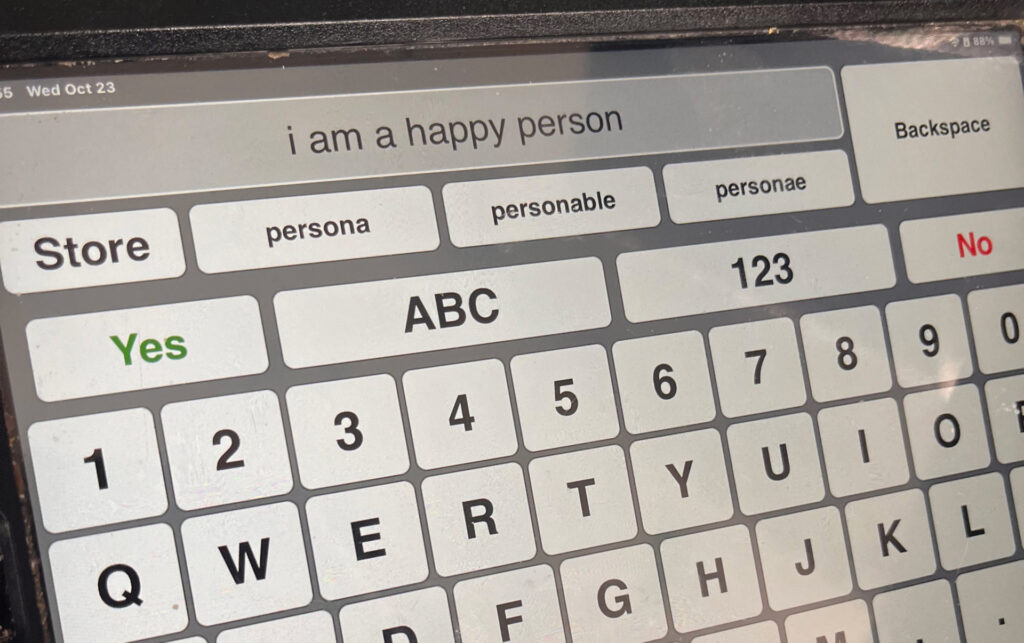When Stone first started communicating reliably using what’s commonly referred to as “Spelling,” it felt like we had unlocked the world. For years, he had been trapped—fully aware of everything around him but unable to express his thoughts, questions, and ideas. The process of spelling gave Stone a voice, and what he shared was nothing short of extraordinary.
But as we’ve walked this journey, it’s become clear that the term “Spelling” falls short of fully capturing what this process is all about. It doesn’t address the depth of cognitive capability or the remarkable autonomy that non-speakers like Stone demonstrate.
This isn’t about replacing one term with another for the sake of change—it’s about finding language that better reflects the intelligence, autonomy, and intention of the individuals who use these methodologies. The term “spelling” also doesn’t serve as an umbrella for the various methodologies that enable non-speakers to communicate, including Spelling to Communicate (S2C), Rapid Prompting Method (RPM), and other approaches. Each has unique features, but they all share a core truth: non-speakers are capable of intentional, cognitive-driven communication.
That’s why I’m excited to embrace Autonomous Cognitive Communication (ACC) and recognize non-speakers like Stone as Cognitive Communicators (CC-ers).

Why “Spelling” Needs a New Framework
There is nothing wrong with the term “Spelling” on its own – it simply doesn’t tell the whole story. People often think spelling is about learning letters or building vocabulary when they hear the word. That assumption fails to capture the profound transformation that happens when a non-speaker begins to express their thoughts.
Stone is not just “Spelling” out words; he is sharing complex ideas, emotions, and insights that have always been there, waiting to be revealed. He’s not “learning to communicate”; he’s demonstrating his cognitive abilities, his autonomy, and his intent.
Introducing Autonomous Cognitive Communication (ACC)
The term Autonomous Cognitive Communication captures the essence of what’s happening when non-speakers like Stone begin to share their thoughts:
- Autonomous:
Stone’s communication is his own. He isn’t being prompted or guided to form words—he’s actively and independently choosing each letter. ACC highlights this independence, countering the misconception that a communication partner is controlling the process.
- Cognitive:
Stone’s voice is a reflection of his intellect. This process is deeply cognitive, rooted in his ability to think critically, reason, and express himself. The word “cognitive” shifts the focus to the mental capabilities that have often been overlooked or underestimated.
- Communication:
At its heart, this is about connection. ACC isn’t just a tool; it’s a lifeline that allows non-speakers to build relationships, share knowledge, and contribute meaningfully to their communities.
ACC provides a framework that unites these methodologies while placing the emphasis where it belongs: on the autonomy and cognitive brilliance of the individuals who use them.
Celebrating Cognitive Communicators (CC-ers)
Stone isn’t just a “Speller.” He’s a Cognitive Communicator (CC-er). That term feels right because it recognizes who he is—someone who communicates intentionally and intelligently, overcoming significant barriers to share his voice with the world.
“Cognitive Communicator” also gives non-speakers a title they can claim with pride. It’s uplifting and affirming, creating an identity that reflects their capabilities and contributions. And the verb “CC-ing” adds energy to the process—it’s dynamic, modern, and accessible.
When I say, “Stone is CC-ing his thoughts,” I’m not just describing a process—I’m celebrating his independence and his ability to connect.
“This shift from “spelling” to ACC isn’t just about semantics—it’s about ensuring that non-speakers are seen for who they truly are: intelligent, autonomous individuals who deserve to be heard.”
How ACC and CC-ers Will Help the Broader Community
- Creating a Unified Framework:
ACC serves as an umbrella that brings together methodologies like Spelling to Communicate (S2C) and RPM while focusing on what unites them: cognitive-driven, autonomous communication. This unified framework makes it easier to advocate for non-speakers and educate others.
- Fostering Inclusion Across Sectors:
By using terms like ACC and CC-er, we open doors in healthcare, education, and beyond. Organizations are more likely to embrace individuals and methodologies framed around autonomy and cognition, which breaks down barriers to inclusion.
- Empowering Non-Speakers:
Words matter. By calling Stone a Cognitive Communicator, I’m giving him—and others like him—a title that reflects their strengths and contributions, not just the tools they use.
- Strengthening Advocacy Efforts:
Clear, professional terminology like ACC and CC-er helps us speak with authority, which is essential when advocating for the needs and rights of non-speakers. It also helps distinguish ACC from older, discredited methods, ensuring that the focus stays on autonomy and competence.
A Call to Embrace This Evolution
The journey we’ve been on with Stone has shown us how vital communication is—not just for expressing needs, but for truly living. When Stone began CC-ing, his world opened up. He became a collaborator, a storyteller, a dreamer.
This shift from “spelling” to ACC isn’t just about semantics—it’s about ensuring that non-speakers are seen for who they truly are: intelligent, autonomous individuals who deserve to be heard.
The new framework should be embraced to build a stronger, more inclusive future for Stone and every other Cognitive Communicator.
Because every voice deserves to be unlocked—and when we give it the right framework, we unlock the world.
